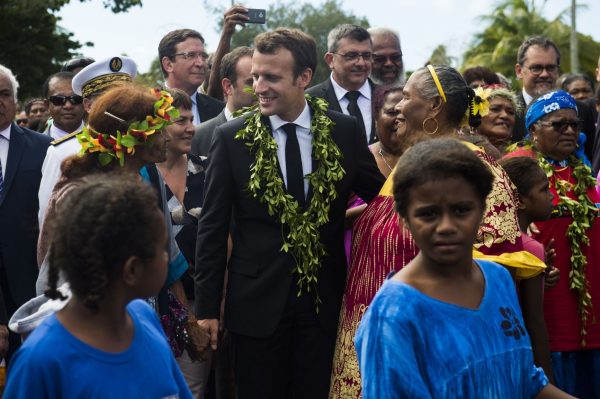In mid-2018, France published a policy paper on the Indo-Pacific. French President Emmanuel Macron found it appropriate to describe France as an Indo-Pacific power, given its overseas territories in both the Indian Ocean and the South Pacific. On 13 November 2020, the Dutch Ministry of Foreign Affairs joined the chorus with its own Indo-Pacific policy paper.
The United Kingdom is promoting a ‘Global Britain’, which involves a ‘very British tilt towards the Indo-Pacific’. This report was launched by Australian Prime Minister Scott Morrison to flag the misleading notion of the ‘Australian option’ in the event of a ‘no deal’ Brexit outcome.
The Indo-Pacific pivot has been followed by some limited hard security efforts — the planned sending of the flagship of the Royal Navy, HMS Queen Elizabeth, for freedom of navigation exercises in the region, as well as Berlin’s dispatch of a frigate to exercise with the Royal Australian Navy.
These are deliberately symbolic gestures. With a post-Trump commitment to multilateralism on both sides of the Atlantic, combining the European Union’s market power with the United States’ hard and soft power ensures the framing of a renewed ‘liberal international order’ alongside like-minded countries in the Indo-Pacific.
Yet European policymakers are conscious that the term Indo-Pacific — especially when qualified as ‘free and open’ — has an anti-Chinese connotation. China is now deemed in Europe to be a ‘systemic rival’. This does not preclude cooperation in areas of mutual interest, like on climate action or even global trade, though it will be transactional and disputable, such as the contentious investment agreement mooted for years end.
China’s aggressive behaviour in the South China Sea prompted a statement before the International Court of Justice, by the United Kingdom, France and Germany, rejecting China’s nine-dash line. Beijing’s repressive behaviour in Hong Kong has led to the realisation that the promise of ‘one country, two systems’ is a delusion, and support for Taiwan has become more vocal in Europe. China’s predatory investment strategy has proved divisive.
The October 2020 Pew Global Attitudes Survey reveals a significant decline in positive views of China within Europe. China is seen as at least partly responsible for the COVID-19 pandemic, and its mask diplomacy has been ineffective in changing that view.
China has been the catalyst of a trans-Atlantic rapprochement. Faced with a pushy emerging hegemon, reinforcing relations with the United States is a desirable option. Even in the twilight of the Trump administration, a dialogue on China between the US State Department and the European External Action Service was initiated. The need to face a common adversary is providing the cement for a reinvigorated alliance.
The election of Joe Biden was greeted with a sigh of relief in Europe, with possible exceptions among the neo-Trumpian leaderships in London, Budapest and Warsaw. Biden is considered one of the last ‘romantic Trans-Atlanticists’. With the return of the United States to the Paris Agreement, and the hope of a renewed partnership in dealing with climate change, this 21st century entente cordiale with the United States is focussed on a third-party, China.
There has been a plethora of think tank reports calling for a renewal of the trans-Atlantic alliance to address China as a systemic rival. The Harvard Kennedy School study, Stronger Together: A Strategy to Revitalize Transatlantic Power, coordinated by close Biden advisor Nicholas Burns may be the most impactful.
China is seen as promoting a troublesome alternative model of international and regional order. On 2 December, the High Representative for European Security and Foreign Affairs, Josep Borrell, issued a Joint Communication to the European Council and the European Parliament proposing a new EU–US agenda for global change. The paper calls for the alignment of EU and US strategic objectives in the Indo-Pacific — a region within which they should promote democratic change. The previous day, the European Union signed a Strategic Partnership Agreement (SPA) with ASEAN.
This adds to a SPA and an economic partnership agreement ratified with South Korea in 2010 and two similar agreements with Japan in 2019. While an SPA was signed with India in 2004, talks on a free trade agreement launched three years later are still on hold. It took 35 rounds of negotiation after its launch in 2013 for an EU–China Comprehensive Agreement on Investment to finally look imminent.
Embracing the Indo-Pacific idea has four interrelated goals for the European Union. First, the term captures its wider Asia policy and partly compensates for the lacuna in its existing patchwork of arrangements. Second, it is a political statement on the salience of Europe’s regulatory power in the region. Third, it provides a foundation for a shared European and American understanding of how to respond to China.
Finally, embracing the Indo-Pacific idea has allowed Europe to add a trans-Atlantic dimension to its bilateral relations in the region. By expressing their willingness to participate in Biden’s planned ‘Summit for Democracy’, Europeans have indicated the ideological dimension to their objectives in the region.
David Camroux is an Honorary Senior Research Fellow at the Center for International Studies, Sciences Po, and a Professorial Fellow at the Vietnam National University (USSH) Hanoi. He is the former Dissemination Coordinator of the European Horizon 2020 project, CRISEA.


Can anyone tell me how is Indo-Pacific different from Asia-Pacific that we grew up with?